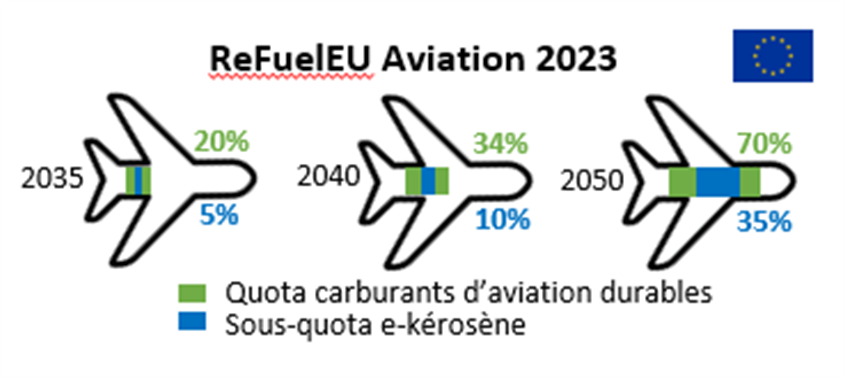05.02.2025
5 minutes of reading

E-fuels: challenges and opportunities
Focus n°1
E-fuels, E-molécules: Why accelerate and deploy these sectors now?
Carbon Capture and Utilization (CCU): a key lever for carbon neutrality
CCU encompasses a set of technologies aimed at capturing CO2 (from industrial emissions or from the atmosphere) and transforming it into value-added products such as fuels, chemicals, or materials, thereby creating a circular carbon economy. CCU differs from Carbon Capture and Storage (CCS), which seeks to permanently store CO2 using technological carbon sinks, in a linear economy approach. These are two complementary pathways, each providing distinct services in the pursuit of decarbonization.
The challenge of CCU lies in 'defossilizing' sectors that cannot fully transition to massive electrification and will continue to rely on carbon-containing molecules. Synthetic fuels and chemicals (e-fuels and e-molecules) will replace fossil fuels, especially in long-distance, maritime, and aviation transport. This transformation involves using captured CO2, hydrogen, and low-carbon energy as raw materials to produce carbon-containing molecules like kerosene, diesel, gasoline, methane, methanol, ethanol, dimethylether (DME), and others. CCU technologies complement those aimed at producing biofuels or other bio-based molecules.
Regulation: a key driver for the deployement of e-fuels sectors

The European Commission is regulating the use of sustainable energies, including e-fuels in aviation and maritime transport. The RED II revised directive mandates the consumption of 1% of sustainable fuels of non-biological origin (e-fuels) in the transport sector by 2030. Initiatives like ReFuelEU Aviation and FuelEU Maritime provide perspectives until 2050 with specific incorporation mandates:
- In the aviation sector, by 2035, 20% of sustainable fuels, including 5% e-fuels, and by 2050, 70%, with 35% being e-fuels.
- In the maritime sector, a minimum of 2% of e-fuels is required by 2034.
In France, the General Secretariat for Ecological Planning (SGPE), in its scenarios published in July 2023, also anticipates a contribution from e-fuels to decarbonize transportation by 2030. As for synthetic chemicals, regulations from both the European and French authorities are yet to be announced.
An environmental, economic and sovereignty challenge for France
In France, with a need to convert approximately 15 Mt of CO2 into e-SAF by 2050, the volumes of CO2 targeted by CCU sector1 are of the same order of magnitude as those aimed for by the CCS sector (15-20 Mt)2. France possesses key advantages for developing CCU: an existing industrial network, low-carbon electricity, and technologies developed by French entities across all aspects of the value chain (CO2 capture, hydrogen production, sustainable liquid fuel production). These represent a genuine opportunity to decarbonize the economy, foster new industries, enhance sovereignty, and export French technologies internationally.
In France, with a need to convert approximately 15 Mt of CO2 into e-SAF by 2050, the volumes of CO2 targeted by CCU sector are of the same order of magnitude as those aimed for by the CCS sector (15-20 Mt) . France possesses key advantages for developing CCU: an existing industrial network, low-carbon electricity, and technologies developed by French entities across all aspects of the value chain (CO2 capture, hydrogen production, sustainable liquid fuel production). These represent a genuine opportunity to decarbonize the economy, foster new industries, enhance sovereignty, and export French technologies internationally.
1 According to 'Decarbonization of the Aviation Sector through the Production of Sustainable Fuels,' Academy of Technologies, February 2023.
2 Cf CCUS strategy published in the frame of « France 2030 initiative », June 2023 (only in French)
E-fuels: challenges and opportunities - Glossary
ADEME: French energy transition agency (www.ademe.fr)
ANCRE: French National Alliance of Coordination of Research for Energy
CBAM: Carbon Border Adjustment Mechanism






